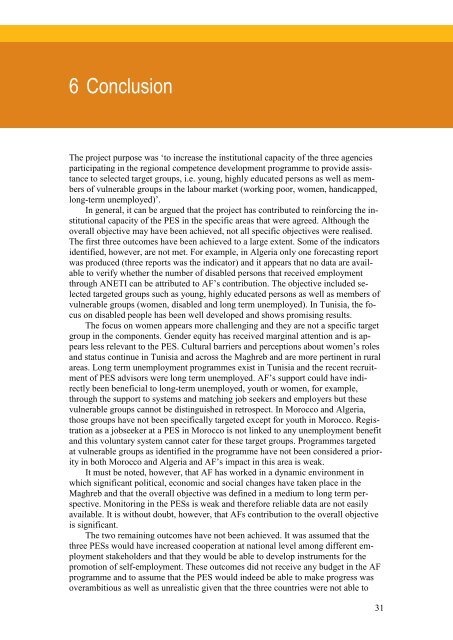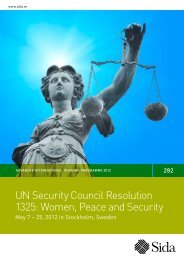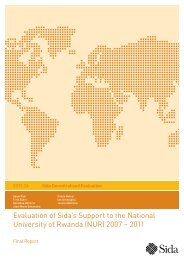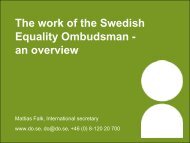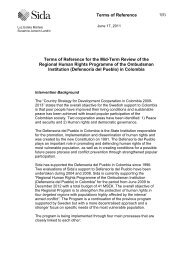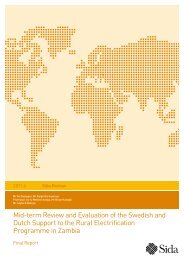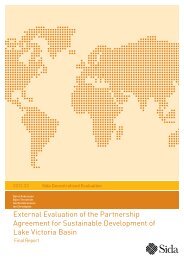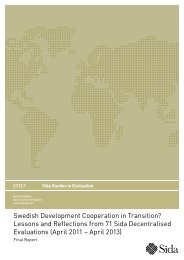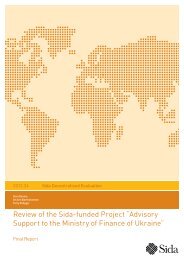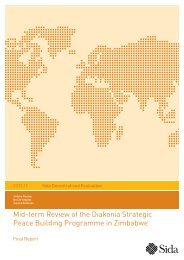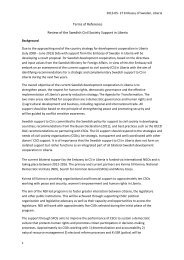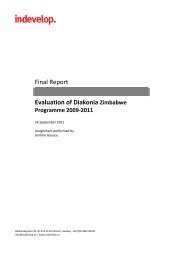Evaluation of the Maghreb Regional Training Programme - Indevelop
Evaluation of the Maghreb Regional Training Programme - Indevelop
Evaluation of the Maghreb Regional Training Programme - Indevelop
You also want an ePaper? Increase the reach of your titles
YUMPU automatically turns print PDFs into web optimized ePapers that Google loves.
6 Conclusion<br />
The project purpose was ‘to increase <strong>the</strong> institutional capacity <strong>of</strong> <strong>the</strong> three agencies<br />
participating in <strong>the</strong> regional competence development programme to provide assistance<br />
to selected target groups, i.e. young, highly educated persons as well as members<br />
<strong>of</strong> vulnerable groups in <strong>the</strong> labour market (working poor, women, handicapped,<br />
long-term unemployed)’.<br />
In general, it can be argued that <strong>the</strong> project has contributed to reinforcing <strong>the</strong> institutional<br />
capacity <strong>of</strong> <strong>the</strong> PES in <strong>the</strong> specific areas that were agreed. Although <strong>the</strong><br />
overall objective may have been achieved, not all specific objectives were realised.<br />
The first three outcomes have been achieved to a large extent. Some <strong>of</strong> <strong>the</strong> indicators<br />
identified, however, are not met. For example, in Algeria only one forecasting report<br />
was produced (three reports was <strong>the</strong> indicator) and it appears that no data are available<br />
to verify whe<strong>the</strong>r <strong>the</strong> number <strong>of</strong> disabled persons that received employment<br />
through ANETI can be attributed to AF’s contribution. The objective included selected<br />
targeted groups such as young, highly educated persons as well as members <strong>of</strong><br />
vulnerable groups (women, disabled and long term unemployed). In Tunisia, <strong>the</strong> focus<br />
on disabled people has been well developed and shows promising results.<br />
The focus on women appears more challenging and <strong>the</strong>y are not a specific target<br />
group in <strong>the</strong> components. Gender equity has received marginal attention and is appears<br />
less relevant to <strong>the</strong> PES. Cultural barriers and perceptions about women’s roles<br />
and status continue in Tunisia and across <strong>the</strong> <strong>Maghreb</strong> and are more pertinent in rural<br />
areas. Long term unemployment programmes exist in Tunisia and <strong>the</strong> recent recruitment<br />
<strong>of</strong> PES advisors were long term unemployed. AF’s support could have indirectly<br />
been beneficial to long-term unemployed, youth or women, for example,<br />
through <strong>the</strong> support to systems and matching job seekers and employers but <strong>the</strong>se<br />
vulnerable groups cannot be distinguished in retrospect. In Morocco and Algeria,<br />
those groups have not been specifically targeted except for youth in Morocco. Registration<br />
as a jobseeker at a PES in Morocco is not linked to any unemployment benefit<br />
and this voluntary system cannot cater for <strong>the</strong>se target groups. <strong>Programme</strong>s targeted<br />
at vulnerable groups as identified in <strong>the</strong> programme have not been considered a priority<br />
in both Morocco and Algeria and AF’s impact in this area is weak.<br />
It must be noted, however, that AF has worked in a dynamic environment in<br />
which significant political, economic and social changes have taken place in <strong>the</strong><br />
<strong>Maghreb</strong> and that <strong>the</strong> overall objective was defined in a medium to long term perspective.<br />
Monitoring in <strong>the</strong> PESs is weak and <strong>the</strong>refore reliable data are not easily<br />
available. It is without doubt, however, that AFs contribution to <strong>the</strong> overall objective<br />
is significant.<br />
The two remaining outcomes have not been achieved. It was assumed that <strong>the</strong><br />
three PESs would have increased cooperation at national level among different employment<br />
stakeholders and that <strong>the</strong>y would be able to develop instruments for <strong>the</strong><br />
promotion <strong>of</strong> self-employment. These outcomes did not receive any budget in <strong>the</strong> AF<br />
programme and to assume that <strong>the</strong> PES would indeed be able to make progress was<br />
overambitious as well as unrealistic given that <strong>the</strong> three countries were not able to<br />
31


